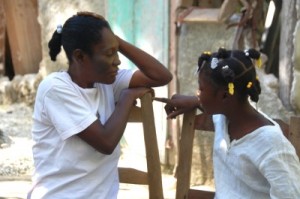It’s back-to-school time for many Free the Slaves supporters. That means it’s a perfect opportunity to reflect on the importance of educating a child. I thought I should share with you the observations of our development director, Lori Fitzmaurice, from her recent trip to our front line anti-slavery program in mountain villages near Jacmel, Haiti. Free the Slaves provides access to schooling for Haitian children who are survivors of domestic servitude, as well as those at risk of enslavement.
I so want you to know how this work is really changing the landscape of slavery. If I were a donor (and I am), I would want to know that my money is making a difference.
Little prepares you for the sheer pervasiveness of poverty in Haiti. Complete lack of infrastructure, roads and buildings in shambles, garbage-lined streets and poor sanitation are repeated corner by corner. But, Haiti is a country in constant motion, unwavering, refusing to be defined by what it lacks. True resilience.
I spent time with Smith Maxime, our country director, who grew up in Haiti and lives in Port-au-Prince. Smith is a wonderful person, dedicating himself to ridding Haiti of restavek, the system of child domestic servitude that is rampant. Smith took me to two remote villages, Marre and Sou Platon. I spoke with children who survived restavek, rescued by their parents, and the community members who formed komantims, or child protection committees, a model that Free the Slaves has developed in all of our countries to identify those enslaved, liberate them, and prevent slavery from taking hold in villages. I know our model works. But to hear it from the people who live it every day, moved me to tears on more than one occasion.
Natasha speaks with her mom, who was inspired by Free the Slaves to rescue her daughter from restavek slavery | Photo: FTS/FitzPatrick
I was lucky to sit with some of the children of Marre and hear what they care about. There, I met Natasha – she is the young girl featured in our Haiti video. The girl you see in the video was tearful describing her ordeal in slavery, but she is now smiling and happy as a 15 year old in school. Her worry is that komantim members, who pool resources to ensure children have a local school, will not be able in the future to help her make-up the fees. Nothing a child should have to worry about.
The komantim is fundamental to the Free the Slaves model. In the case of Marre, the members formed three groups: the child protection committee; the model farmers, those who are planting their land under the guidance of an agronomist we hired last year; and a savings and loan group. This group pools money for small loans to villagers who need farming tools, small household repairs, school fees and emergencies that impact the entire village. Although their resources are few, they are working towards a self-sustaining program that helps lift all the residents.
I’m so heartened by what I saw. I wish everyone could see this firsthand. I promised those girls I would raise money to help this program, and I’m more determined than ever to make good on that promise.
Help us make good on Lori’s promise. Help us ensure that no child has to worry about affording basic education.
Break slavery. Build freedom.

